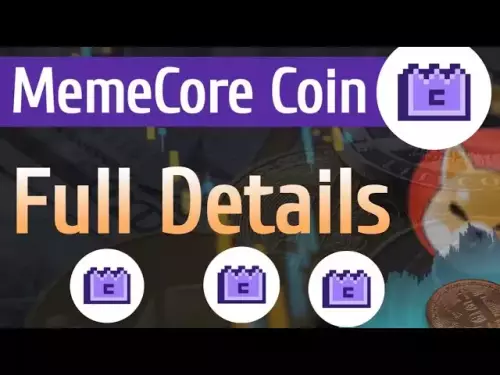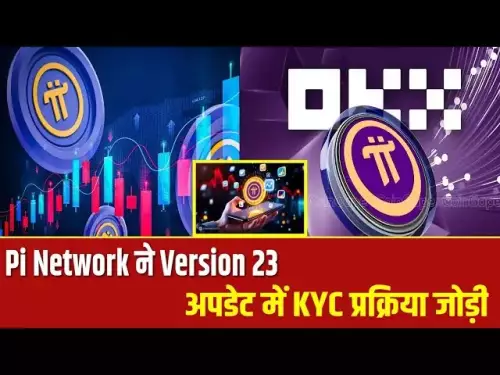-
 Bitcoin
Bitcoin $111200
0.44% -
 Ethereum
Ethereum $4302
0.12% -
 XRP
XRP $2.835
0.93% -
 Tether USDt
Tether USDt $1.000
0.06% -
 BNB
BNB $870.9
1.41% -
 Solana
Solana $203.8
0.29% -
 USDC
USDC $0.9999
0.03% -
 Dogecoin
Dogecoin $0.2178
1.53% -
 TRON
TRON $0.3284
-0.90% -
 Cardano
Cardano $0.8288
0.92% -
 Hyperliquid
Hyperliquid $47.24
1.45% -
 Chainlink
Chainlink $22.34
0.67% -
 Ethena USDe
Ethena USDe $1.001
0.05% -
 Sui
Sui $3.391
1.19% -
 Bitcoin Cash
Bitcoin Cash $598.8
-2.18% -
 Stellar
Stellar $0.3581
0.37% -
 Avalanche
Avalanche $24.59
1.88% -
 Hedera
Hedera $0.2199
1.96% -
 Cronos
Cronos $0.2631
-2.42% -
 UNUS SED LEO
UNUS SED LEO $9.490
-0.66% -
 Litecoin
Litecoin $114.0
2.18% -
 Toncoin
Toncoin $3.090
0.86% -
 Shiba Inu
Shiba Inu $0.00001237
0.84% -
 Polkadot
Polkadot $3.859
1.53% -
 World Liberty Financial
World Liberty Financial $0.2393
25.43% -
 Uniswap
Uniswap $9.388
1.32% -
 Dai
Dai $0.9999
0.02% -
 Ethena
Ethena $0.7417
-0.13% -
 Monero
Monero $269.7
-0.63% -
 Aave
Aave $301.5
0.20%
Introduction to Bitcoin: What is Bitcoin? How to get BTC_ Bitcoin
Bitcoin, the decentralized digital currency introduced in 2009, operates independently of central banks, utilizing blockchain technology for secure and transparent transactions.
Jan 25, 2025 at 04:42 am

Introduction to Bitcoin: What is Bitcoin? How to get BTC
Key Points:- Understanding the fundamentals of Bitcoin, its history, and its unique characteristics.
- Demystifying the process of acquiring Bitcoin through various reputable platforms.
- Exploring the different storage options available to ensure the security and accessibility of Bitcoin holdings.
Understanding Bitcoin: The Revolutionary Cryptocurrency
Bitcoin, the brainchild of the enigmatic Satoshi Nakamoto, emerged in 2009 as a revolutionary concept that has forever altered the financial landscape. It is a decentralized digital currency that operates independently of central banks or government entities. Unlike traditional fiat currencies, Bitcoin relies on a distributed ledger technology known as blockchain, which ensures the security and transparency of transactions.
Unique Features of Bitcoin:- Decentralization: Bitcoin is not controlled by any single entity, making it immune to political or economic manipulation.
- Security: Transactions are immutably recorded on the blockchain, providing a secure and tamper-proof mechanism.
- Scarcity: The total supply of Bitcoin is capped at 21 million, creating a sense of scarcity that supports its value.
- Anonymity: Transactions are pseudonymous, offering a degree of privacy, although the blockchain does provide a publicly viewable record of transactions.
Acquiring Bitcoin: A Comprehensive Guide
Embarking on the journey of owning Bitcoin requires selecting a reliable platform that facilitates the purchase and exchange of digital currencies. Here are the key steps involved in acquiring BTC:
Step 1: Choose a Reputable ExchangeInvestigate and compare different cryptocurrency exchanges based on factors like security, fees, user interface, and customer support. Consider popular exchanges like Coinbase, Binance, or Kraken that prioritize security and offer a wide range of coins.
Step 2: Create an AccountFollow the platform's registration process by providing personal information for identity verification. Secure your account with strong passwords and enable two-factor authentication (2FA) for added security.
Step 3: Deposit FundsConnect your bank account or use alternative payment methods like credit/debit cards or wire transfers to fund your exchange account. Verify the deposit before initiating a purchase.
Step 4: Purchase BitcoinLocate the BTC-USD or BTC-EUR trading pair (depending on your currency) and input the desired amount of Bitcoin you wish to purchase. Monitor market conditions and check the latest Bitcoin price before executing the trade.
Step 5: Store Your Bitcoin SafelyAfter acquiring Bitcoin, it is crucial to safeguard your holdings. Consider using a hardware wallet, a physical device designed to store private keys offline, providing enhanced protection against cyberattacks.
FAQs: Unraveling Common Bitcoin Questions
Q: How much is Bitcoin worth?A: The value of Bitcoin fluctuates in real-time based on market demand and supply. Check reputable sources like CoinMarketCap or Binance for the latest Bitcoin price.
Q: Is Bitcoin legal?A: The legality of Bitcoin varies by jurisdiction. While many countries have embraced Bitcoin, some regions have implemented regulations or restrictions on its use.
Q: Is Bitcoin a good investment?A: The volatility of Bitcoin makes it both a high-risk and potentially high-reward investment. Investors should conduct thorough research and weigh the risks and benefits before making any investment decisions.
Q: How can I mine Bitcoin?A: Bitcoin mining involves solving complex mathematical equations to validate transactions and create new blocks on the blockchain. Specialized hardware called ASIC miners is typically used for efficient mining.
Q: Can I use Bitcoin to buy goods and services?A: While Bitcoin's adoption as a payment method is growing, its acceptance is still limited compared to traditional currencies. However, there are increasing numbers of merchants accepting Bitcoin for online and in-store purchases.
Disclaimer:info@kdj.com
The information provided is not trading advice. kdj.com does not assume any responsibility for any investments made based on the information provided in this article. Cryptocurrencies are highly volatile and it is highly recommended that you invest with caution after thorough research!
If you believe that the content used on this website infringes your copyright, please contact us immediately (info@kdj.com) and we will delete it promptly.
- XRP ETF Buzz & Altcoin Action: Decoding ARB, PEPE, and the Crypto Landscape
- 2025-09-08 03:05:16
- Solana Price, Meme Coins, and Layer Brett: What's the Hype?
- 2025-09-08 02:45:11
- WLFI Token: Viability and Institutional Backing - A NYC Perspective
- 2025-09-08 02:25:13
- XRP Price, Meme Coin Mania, and the Potential for Explosive Gains: What's a Crypto Investor to Do?
- 2025-09-08 00:45:14
- Cracking the Crypto Code: Passive Income & ROI Plays for Savvy New Yorkers
- 2025-09-08 00:25:14
- Price, Traders, and Rally Targets: Decoding Crypto Market Moves
- 2025-09-08 01:05:16
Related knowledge

What is Ethereum’s Slashing mechanism and how to punish malicious behavior?
Feb 20,2025 at 03:08am
Key PointsOverview of slashingDifferent types of slashing in EthereumIncentives and consequences of slashingIdentifying and reporting slashed validato...

What is the verifier node of Ethereum and how to become a verifier?
Feb 19,2025 at 06:00pm
The Verifier Node of Ethereum: A Comprehensive GuideKey Points:What is a Verifier Node?How to Become a Verifier NodeResponsibilities and Rewards of a ...

What is Ethereum’s staking, and how to participate and earn money?
Feb 19,2025 at 04:37pm
Key Points:Understanding Ethereum's Staking MechanismSteps to Participate in StakingBenefits and Rewards of StakingSecurity and Risk ConsiderationsTec...

What is Ethereum’s DAO (Decentralized Autonomous Organization) and how does it work?
Feb 20,2025 at 03:12am
Key PointsDefinition and Structure of a DAOGovernance and Decision-Making in DAOsBenefits and Use Cases of DAOsChallenges and Limitations of DAOsWhat ...

What is Ethereum's multi-signature wallet and how to improve security?
Feb 20,2025 at 02:18pm
Key Points:Understanding the Concept of a Multi-Signature WalletBenefits and Drawbacks of Multisig WalletsRequirements for Setting Up a Multisig Walle...

What is Ethereum's oracle and how to provide data for smart contracts?
Feb 21,2025 at 01:30am
Key Points:Understanding the concept of oracles in EthereumExploring different types of oraclesDetailed guide on how to provide data for smart contrac...

What is Ethereum’s Slashing mechanism and how to punish malicious behavior?
Feb 20,2025 at 03:08am
Key PointsOverview of slashingDifferent types of slashing in EthereumIncentives and consequences of slashingIdentifying and reporting slashed validato...

What is the verifier node of Ethereum and how to become a verifier?
Feb 19,2025 at 06:00pm
The Verifier Node of Ethereum: A Comprehensive GuideKey Points:What is a Verifier Node?How to Become a Verifier NodeResponsibilities and Rewards of a ...

What is Ethereum’s staking, and how to participate and earn money?
Feb 19,2025 at 04:37pm
Key Points:Understanding Ethereum's Staking MechanismSteps to Participate in StakingBenefits and Rewards of StakingSecurity and Risk ConsiderationsTec...

What is Ethereum’s DAO (Decentralized Autonomous Organization) and how does it work?
Feb 20,2025 at 03:12am
Key PointsDefinition and Structure of a DAOGovernance and Decision-Making in DAOsBenefits and Use Cases of DAOsChallenges and Limitations of DAOsWhat ...

What is Ethereum's multi-signature wallet and how to improve security?
Feb 20,2025 at 02:18pm
Key Points:Understanding the Concept of a Multi-Signature WalletBenefits and Drawbacks of Multisig WalletsRequirements for Setting Up a Multisig Walle...

What is Ethereum's oracle and how to provide data for smart contracts?
Feb 21,2025 at 01:30am
Key Points:Understanding the concept of oracles in EthereumExploring different types of oraclesDetailed guide on how to provide data for smart contrac...
See all articles

























































































